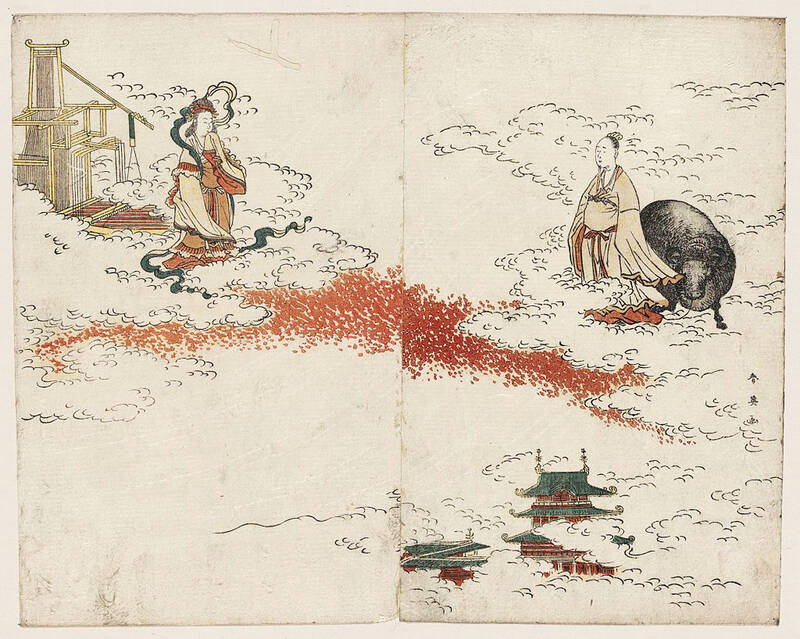對話 Dialogue
小清:七夕你送女朋友禮物了嗎?
Xiǎoqīng: Qīxī nǐ sòng nǚ péngyǒu lǐwù le ma?

Photo courtesy of Wikimedia Commons / 照片:維基共享資源提供
小華:別提了!我哪知道農曆七月還有一個情人節!我女朋友還在生氣呢!
Xiǎohuá: Bié tí le! Wǒ nǎ zhīdào nónglì qīyuè hái yǒu yígè qíngrén jié! Wǒ nǚ péngyǒu hái zài shēngqì ne!
小清:七夕是中國情人節,是個很浪漫的節日。
Xiǎoqīng: Qīxī shì Zhōngguó qíngrén jié, shì gè hěn làngmàn de jiérì.
小華:怎麼說?
Xiǎohuá: Zěnme shuō?
小清:傳說中牛郎和織女一年只能在七夕這天見一次面,所以每到七夕傍晚總會下起小雨,這是他們久別重逢,流下相思的淚水。
Xiǎoqīng: Chuánshuō zhōng Niúláng hàn Zhīnǚ yìnián zhǐ néng zài Qīxī zhè tiān jiàn yícì miàn, suǒyǐ měi dào Qīxī bāngwǎn zǒng huì xià qǐ xiǎoyǔ, zhè shì tāmen jiǔbié chóngféng, liú xià xiāngsī de lèishuǐ.
小華:那我覺得我女朋友一定很愛我!
Xiǎohuá: Nà wǒ juéde wǒ nǚ péngyǒu yídìng hěn ài wǒ!
小清:為什麼呢?
Xiǎoqīng: Wèishéme ne?
小華:因為她那天不只流下淚水,還像颱風一樣呢!
Xiǎohuá: Yīnwèi tā nàtiān bùzhǐ liú xià lèishuǐ, hái xiàng táifēng yíyàng ne!
小清:那你最好趕快去跟她賠罪,做好災後重建的工作。
Xiǎoqīng: Nà nǐ zuìhǎo gǎnkuài qù gēn tā péizuì, zuòhǎo zāihòu chóngjiàn de gōngzuò.
翻譯 Translation
Xiaoqing: Did you give your girlfriend a gift for Qixi?
Xiaohua: Don’t bring that up! How would I know there’s another Valentine’s Day on the lunar calendar? She’s still mad at me!
Xiaoqing: Qixi is Chinese Valentine’s Day, a very romantic holiday.
Xiaohua: How so?
Xiaoqing: Legend has it that the Cowherd and the Weaving Maid can only meet once a year on Qixi. So, every Qixi evening, it always rains lightly. It symbolizes their long-awaited reunion and the tears of longing they shed.
Xiaohua: Well, then I believe my girlfriend must love me a lot!
Xiaoqing: Why do you say that?
Xiaohua: Because on that day, she didn’t just shed tears, she was like a typhoon!
Xiaoqing: In that case, you’d better hurry up and apologize to her, and be prepared for the post-disaster reconstruction work.
生詞 Vocabulary
1. 七夕 (Qīxì) the 7th day of the 7th month of the lunar calendar.
2. 牛郎 (Niúláng) Cowherd
3. 織女 (Zhīnǚ) Weaving Maid
4. 久別重逢 (jiǔbiéchóngféng) long-awaited reunion
5. 相思 (xiāngsī) longing for one’s lover
6. 淚水 (lèishuǐ) tears
7. 賠罪 (péizuì) apologize
8. 災後重建 (zāihòu chóngjiàn) post-disaster reconstruction
教材音檔 Audio Files
國立清華大學華語中心提供
By National Tsing Hua University Chinese Language Center:

In an effort to fight phone scams, British mobile phone company O2 has introduced Daisy, an AI designed to engage phone con artists in time-wasting conversations. Daisy is portrayed as a kindly British granny, exploiting scammers’ tendency to target the elderly. Her voice, based on a real grandmother’s for authenticity, adds to her credibility in the role. “O2” has distributed several dedicated phone numbers online to direct scammers to Daisy instead of actual customers. When Daisy receives a call, she translates the scammers’ spoken words into text and then responds to them accordingly through a text-to-speech system. Remarkably, Daisy

Bilingual Story is a fictionalized account. 雙語故事部分內容純屬虛構。 Emma had reviewed 41 resumes that morning. While the ATS screened out 288 unqualified, she screened for AI slop. She could spot it a mile away. She muttered AI buzzwords like curses under her breath. “Team player.” “Results-driven.” “Stakeholder alignment.” “Leveraging core competencies.” Each resume reeked of AI modeling: a cemetery of cliches, tombstones of personality. AI wasn’t just changing hiring. It was draining the humanity from it. Then she found it: a plain PDF cover letter. No template. No design flourishes. The first line read: “I once tried to automate my

Every May 1, Hawaii comes alive with Lei Day, a festival celebrating the rich culture and spirit of the islands. Initiated in 1927 by the poet Don Blanding, Lei Day began as a tribute to the Hawaiian custom of making and wearing leis. The idea was quickly adopted and officially recognized as a holiday in 1929, and leis have since become a symbol of local pride and cultural preservation. In Hawaiian culture, leis are more than decorative garlands made from flowers, shells or feathers. For Hawaiians, giving a lei is as natural as saying “aloha.” It shows love and

1. 他走出門,左右看一下,就過了馬路。 ˇ He walked outside, looked left and right, and crossed the road. χ He walked outside and looked left and right, crossed the road. 註︰並列連接詞 and 在這句中連接三個述語。一般的結構是 x, y, and z。x and y and z 是加強語氣的結構,x and y, z 則不可以。 2. 他們知道自己的弱點以及如何趕上其他競爭者。 ˇ They saw where their weak points lay and how they could catch up with the other competitors. χ They saw where their weak points lay and how to catch up with the other competitors. 註:and 一般連接同等成分,結構相等的單詞、片語或子句。誤句中 and 的前面是子句,後面是不定詞片語,不能用 and 連接,必須把不定詞片語改為子句,and 前後的結構才相等。 3. 她坐上計程車,直接到機場。 ˇ She took a cab, which took her straight to the airport. ˇ She took a cab and it took her straight